Key takeaways:
- Home automation enhances convenience and efficiency in daily life but raises important privacy concerns.
- Smart devices collect personal data, necessitating careful consideration of privacy settings and the security of these technologies.
- Balancing the benefits of smart technology with potential risks requires proactive measures and informed choices.
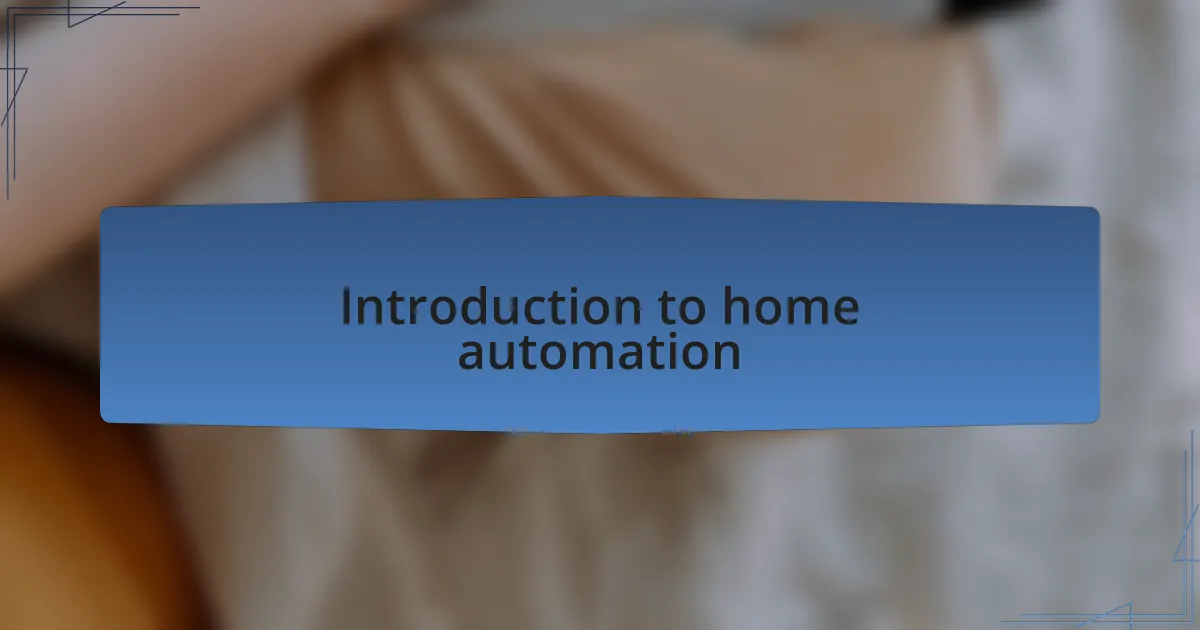
Introduction to home automation
Home automation represents a transformative shift in how we interact with our living spaces. I still remember the first time I set up my smart home hub; it felt like stepping into the future. This technology enables us to control numerous devices—from lighting to security systems—through our smartphones or voice commands, bringing both convenience and efficiency into our daily lives.
Have you ever thought about how much time we waste on routine tasks? With home automation, I find that I can streamline everyday activities, like adjusting the thermostat or turning on lights, with just a simple command. This not only saves time but also makes life more comfortable, allowing me to focus on what truly matters—spending time with family and pursuing my interests.
As I explore this fascinating realm, it’s clear that home automation isn’t just about convenience. It’s about creating a personalized environment that reflects who we are and how we live. Isn’t it incredible to consider how these smart technologies can enhance our homes and even contribute to our well-being?
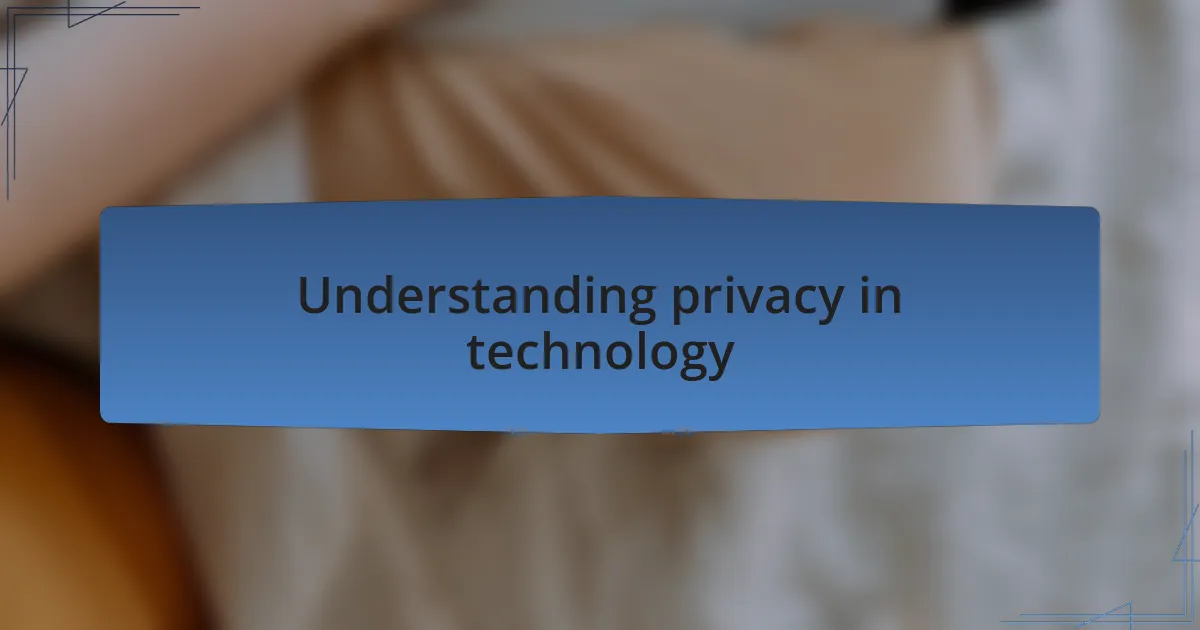
Understanding privacy in technology
Understanding privacy in technology is crucial in today’s digital landscape. Reflecting on my experiences, I often find myself questioning who has access to the data collected by my smart devices. For instance, when I first installed a smart speaker, the idea of it constantly listening felt unnerving. It made me wonder: are my private conversations really private?
I’ve come to realize that while these gadgets offer remarkable convenience, they may give away more about our lives than we intend. Every time I remotely check my security camera or adjust my thermostat, I can’t help but ponder the underlying implications. Companies tend to track our preferences and habits—how often do we weigh the trade-off between privacy and convenience when integrating these technologies into our lives?
Navigating this balance has become essential for me. I’ve learned to be proactive, ensuring I understand the privacy settings available to manage what information I’m sharing. It’s empowering to take control, but the question remains: how many people are as vigilant about their privacy in the face of growing smart technology? This ongoing dialogue about privacy reflects our collective responsibility to safeguard not just our data, but our autonomy in this increasingly connected world.
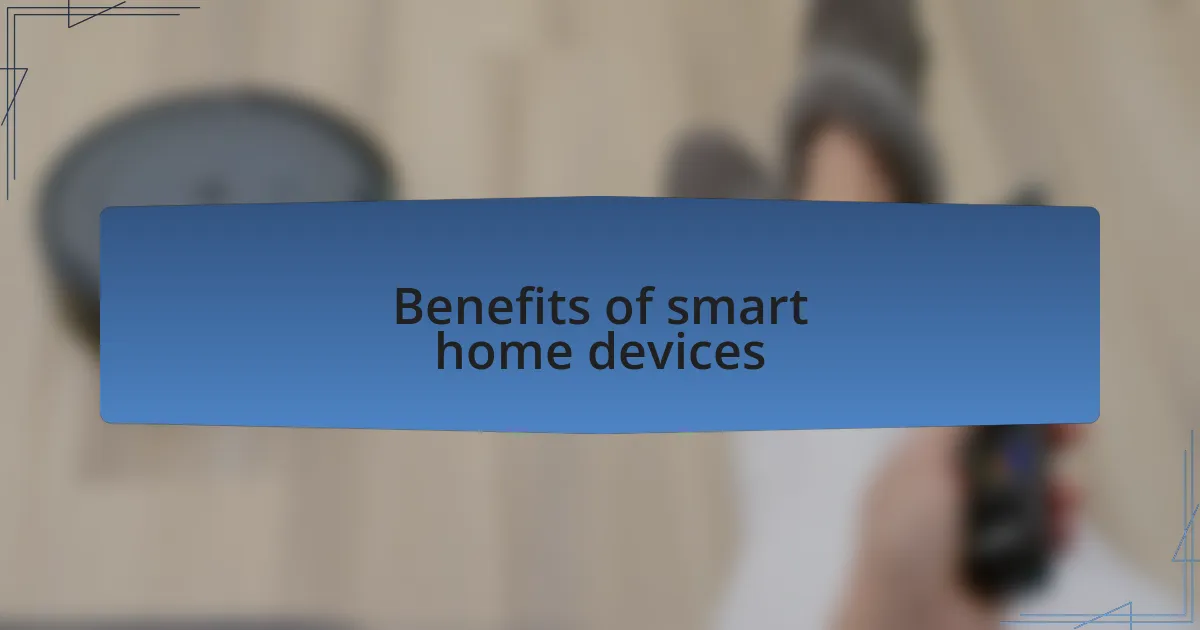
Benefits of smart home devices
Smart home devices genuinely enhance our lives through automation, offering convenience that I didn’t realize I was missing until I tried them. For example, I remember the first time my smart thermostat adjusted itself based on my schedule; it felt like I was living in the future. It not only saved me time but also helped lower my energy costs, making me appreciate the efficiency these devices can provide.
Moreover, I find the safety features of smart home devices particularly comforting. When I installed smart locks and security cameras, a sense of security washed over me, especially when traveling. I could monitor my home remotely and receive alerts about unusual activity, easing my worries and allowing me to enjoy my time away without constantly fretting about whether I left the door unlocked. Have you ever experienced that sense of freedom knowing you can check in on your home anytime?
Additionally, the integration of voice assistants into my daily routine has simplified tasks I used to consider mundane. Whether it’s turning off the lights or setting reminders, these devices become companions making life more manageable. I often wonder how long it would take me to return to a non-smart environment, given how accustomed I am to the comfort of saying, “Hey, Google!” to control my home, empowering me to focus on what truly matters—spending quality time with family and friends.
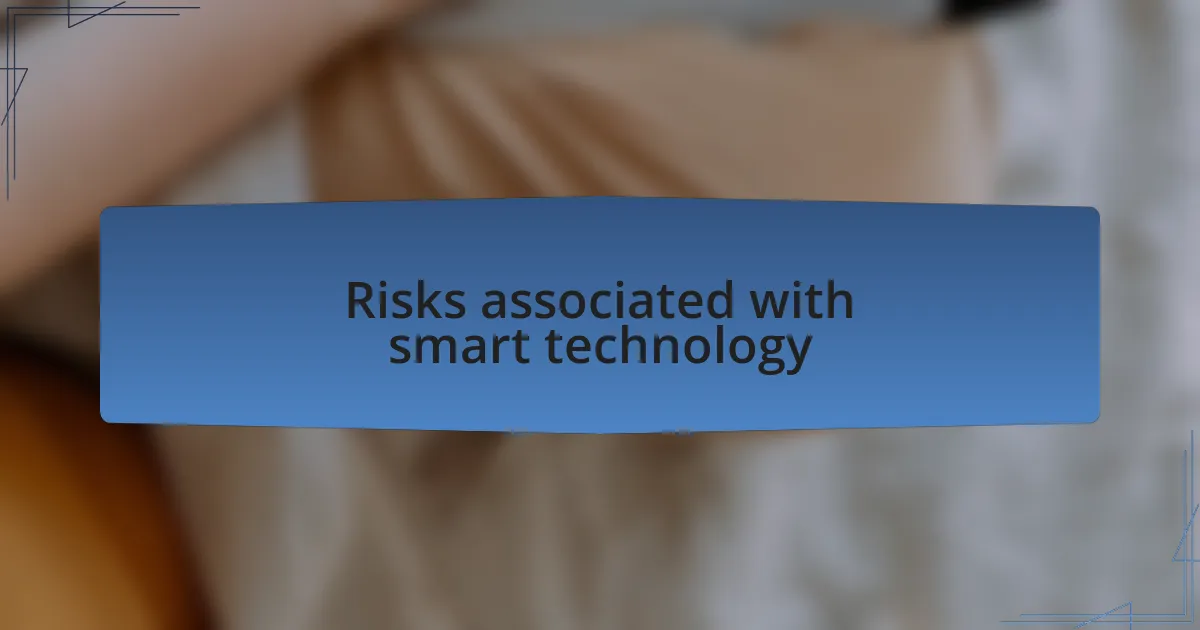
Risks associated with smart technology
It’s crucial to acknowledge that smart technology also comes with significant risks that can impact our privacy. I recently read about a family whose smart security camera was hacked, leading to unsettling breaches of privacy. Imagine the shock of discovering that someone was watching your home without your knowledge; it’s a harrowing thought that stayed with me, emphasizing the importance of securing our devices.
Another risk that I personally find alarming is the data collection practices of smart devices. I often wonder who really has access to my personal information. One time, while troubleshooting my smart speaker, I was surprised to find out how much data it gathered about my habits and preferences. It made me uneasy to think that while I enjoy convenience, I am also sharing a part of my life I didn’t intend to expose.
Furthermore, the internet of things (IoT) creates interconnected vulnerabilities that can be exploited. I recall reading about a smart home hub that became a target for cybercriminals due to its connection to multiple devices. The thought of unlocking my home through a trivial oversight sends chills down my spine. How can we enjoy the benefits of smart technology while staying vigilant about our security? Ultimately, it’s a balancing act—one that deserves our attention and proactive measures.
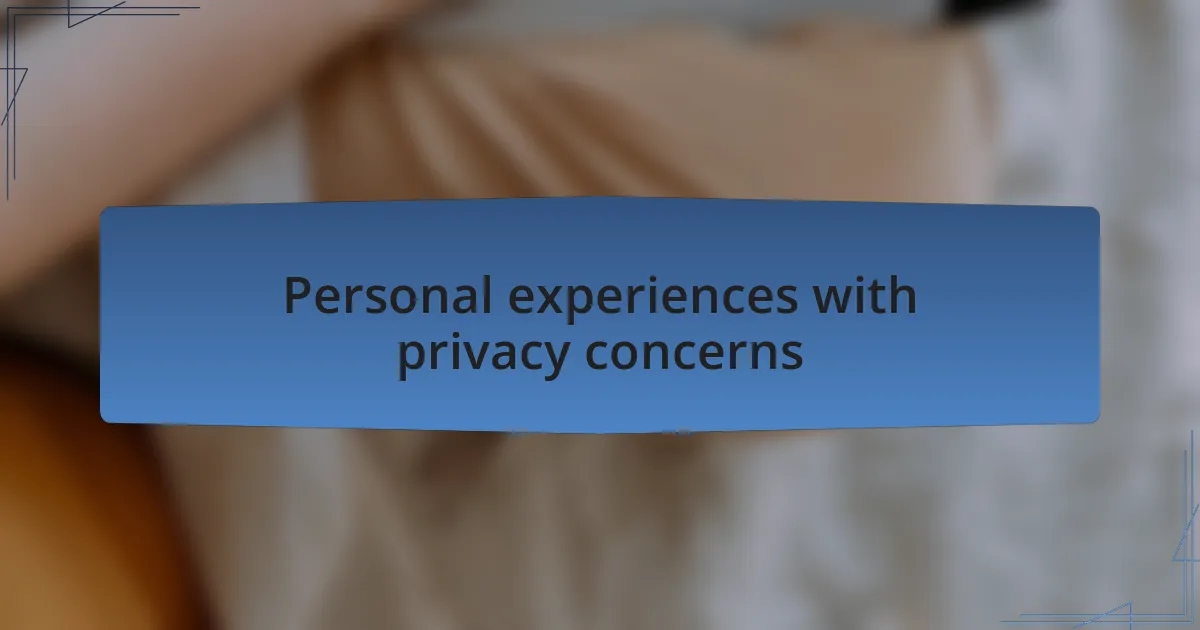
Personal experiences with privacy concerns
I remember a moment when my smart thermostat sent me an alert about an unexpected temperature drop. Initially, I was impressed by its alertness, but then it hit me: this device was monitoring my home environment constantly. It made me question how often it gathers data and what it does with that information. Does it store my routines and behaviors to share with others? I found myself feeling vulnerable, wondering if convenience was worth the price of my privacy.
In another instance, I decided to play around with my smart camera’s features, excited to enhance my home security. However, as I explored the settings, I stumbled upon a shocking option that allowed for facial recognition. My heart raced as the realization dawned on me: the device could be recognizing faces without my explicit consent. What assurances do I have that this data is secure? I found myself in a tug-of-war between wanting to feel safe and grappling with the potential invasiveness of the technology.
There was one night when I received a notification about a nearby trespasser detected by my smart doorbell. It was both a relief and a cause for concern. While I appreciated the alert, it raised questions about surveillance and privacy in my own neighborhood. Am I comfortable with so many eyes, even virtual ones, keeping tabs on my surroundings? It’s a complex emotional response, balancing the safety provided by technology with the unease of constant observation.
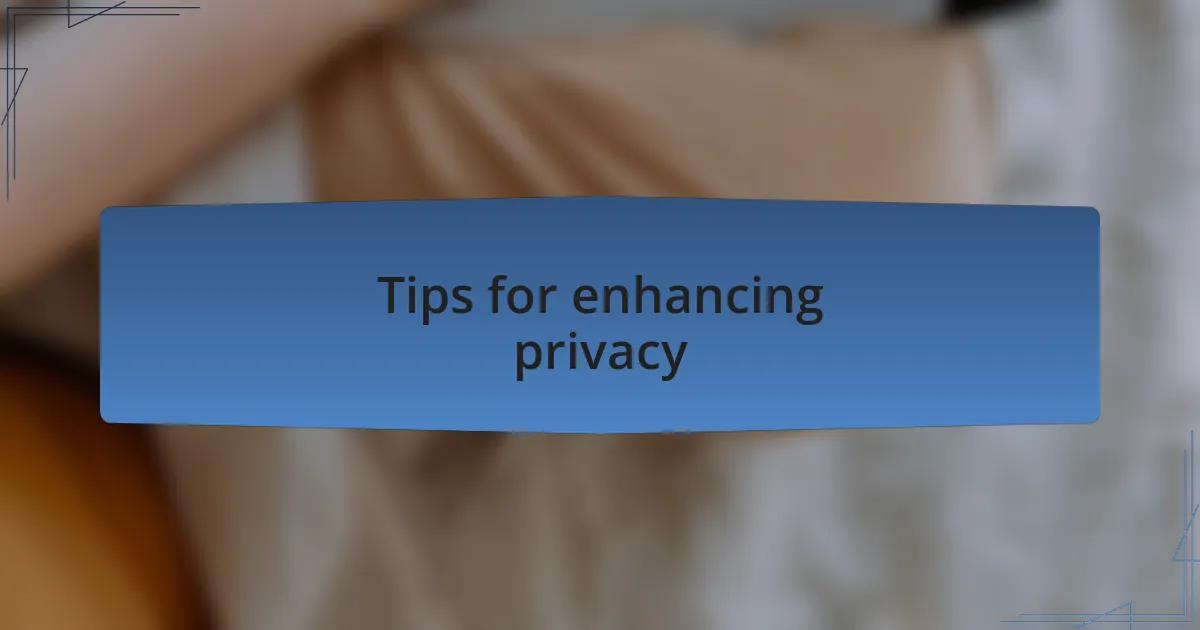
Tips for enhancing privacy
To enhance privacy in your smart technology setup, consider changing the default settings on your devices. I remember when I first set up my smart speaker; it was so tempting to ask it anything and everything. However, I quickly realized that keeping the device constantly listening might not be in my best interest. By turning off features like voice recording and deletion options in the settings, I felt a sense of control over my information.
Regularly updating your devices can also play a significant role in protecting your privacy. I’ve had instances where a simple software update not only added new features but also patched potential security vulnerabilities. It’s a small step that can enhance your device’s defenses against unauthorized access, which brings me peace of mind.
Another tip that I’ve found useful is being selective about which smart devices you bring into your home. While it can be exciting to fill your space with the latest gadgets, I’ve learned that doing a bit of research can go a long way. For instance, I once passed on a popular smart fridge after discovering that it collected data on my grocery habits. The excitement of convenience didn’t outweigh my concerns about what that information could mean for my privacy.